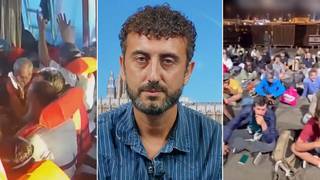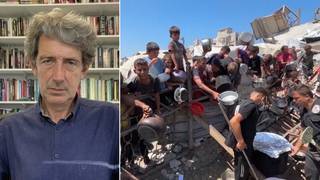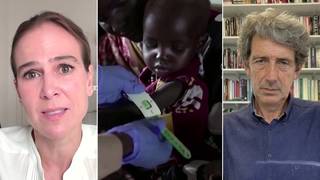
Guests
- Nyoko Muvanguaadvocate who was born of the Ovaherero people and grew up in a village in Namibia.
- Emsie Erastusresearcher focused on decolonization and technology.
Germany has apologized for its role in the first genocide of the 20th century, which took place in Namibia, a former colony then known as German South West Africa. Between 1904 and 1908, German colonizers killed tens of thousands of Ovaherero and Nama people in Namibia. German Foreign Minister Heiko Maas officially described the massacre as genocide and outlined an offer of more than $1.34 billion in development aid to the Namibian government. The offer was not negotiated with survivors of the genocide, and critics have described it as a pittance. We speak with Nyoko Muvangua, born of the Ovaherero people who were targeted for ethnic cleansing by the German government, and Namibian researcher Emsie Erastus.
Transcript
AMY GOODMAN: This is Democracy Now! I’m Amy Goodman, as we turn to look at developments with another G7 country, Germany, which recently apologized for its role in the first genocide of the 20th century, which took place in its former colony known as German South West Africa, now the country of Namibia. Between 1904 and 1908, German colonizers killed tens of thousands of Ovaherero and Nama people in Namibia. Last month, for the first time, German Foreign Minister Heiko Maas officially described the massacre as genocide and outlined an offer of more than $1.34 billion in development aid to Namibia.
HEIKO MAAS: [translated] Today we officially refer to these events as what they were: a genocide. We are therefore acknowledging our historical responsibility. In the light of Germany’s historical and moral responsibility, we will ask Namibia and the descendants of the victims for forgiveness. And as a gesture of recognition of the immeasurable suffering that was inflicted on the victims, we want to support Namibia and the descendants of the victims with a substantial program worth 1.1 billion euros aimed at reconstruction and development.
AMY GOODMAN: The Namibian Parliament is set to vote soon on Germany’s offer, which was not negotiated with survivors of the genocide, and critics have described as a pittance. This week, Namibia’s prime minister, Saara Kuugongelwa-Amadhila, opened a contentious session of Parliament addressing the agreement. She spoke Tuesday.
PRIME MINISTER SAARA KUUGONGELWA-AMADHILA: Since this reparations amount was made public, concerns have been raised that this amount is not enough and that it is unacceptable to the affected communities and the Namibian people.
AMY GOODMAN: Opposition lawmakers spent the parliamentary session denouncing the deal. This is Utaara Mootu of the opposition Landless People’s Movement Namibia.
UTAARA MOOTU: Honorable Prime Minister, never in my existence as a millennial would I say that I’ll be looking at a colonizer the way I’m looking at you right now. You have betrayed us. You have betrayed —
SPEAKER: Order. Order. Order.
UTAARA MOOTU: — the Namibian people.
SPEAKER: Order. Order. Order. Order.
UTAARA MOOTU: You have betrayed our country. You have betrayed our identity. You have betrayed us!
AMY GOODMAN: In a minute, we’ll get response from two Namibians. But first, this is part of a BBC documentary about the genocide by historian David Adetayo Olusoga. It’s titled Namibia: Genocide and the Second Reich.
SAMUEL WEST: For a hundred years, what happened in Germany’s long-lost African empire has been hidden. It’s the story of a genocide that implicates the highest level of the German government, the Army, and even some of Germany’s biggest companies. But the ghosts of the Namibian genocide have been reawoken. They’ve returned to haunt modern, liberal, postwar Germany. And in doing so, they’ve forced Germany to wake up to a very uncomfortable fact: that the dark racial theories that helped inspire the Nazis run much deeper into German and European history than most people want to acknowledge.
BEN MADLEY: Soldiers received specific orders which allowed them to kill anyone. It was an overall strategy aimed at ethnically cleansing the countryside to create Lebensraum for German settlers.
KATUUTIRE KAURA: The whole process was genocidal, of the deliberate extermination of Herero, the vernichtungsbefehl, the destruction order. Many of members of my own family died.
AMY GOODMAN: That’s an excerpt from the BBC documentary Namibia: Genocide and the Second Reich.
For more, we’re joined by two guests. Emsie Erastus is with us. She’s in Windhoek, the capital of Namibia, which was the site of Germany’s first mass concentration camp, where thousands of people were beaten, worked and starved to death by the Army of the Second Reich of Germany. Also with us is Nyoko Muvangua. She is born of Ovaherero people and grew up in a village in Namibia. Now a lawyer in South Africa, she’s joining us from Johannesburg.
I want to begin with Nyoko Muvangua. Can you respond to what Germany is offering and who they negotiated this deal with?
NYOKO MUVANGUA: Good morning, afternoon, depending on where you’re listening from.
What Germany is offering is — there are two answers to that. The first is over a billion euros. And it is not reparations; it is grants. And the amount was negotiated with the Namibian government to the exclusion of both the Ovaherero and the Nama people. We were just excluded from all of this. So, that’s the immediate answer to your question.
AMY GOODMAN: And what is your response to what they are offering? And what are you demanding? You’re a descendant of those who died in this genocide at the turn of the 20th century, the first genocide of the 20th century. And if you can tell us further? Because I think, I daresay, certainly people in the United States, most people, have never heard of what place.
NYOKO MUVANGUA: Sure. If I may, I wonder whether I should commence, perhaps, your question elsewhere. What I would like to start with is what happened between 1904 and 1908, which would better inform my response to your question.
Between 1904 in 1908, Germany, as a colonizer of Namibia, wanted land, Namibian land. And the Ovaherero and Nama people at the time were land and cattle owners. So Germany wanted them to give up their land. When they resisted, the German government, through a general, an Army general called von Trotha, issued an extermination order, which was specific. It said all the Ovaherero and all the Nama peoples must be killed. There were two extermination orders: one pertaining to the Ovaherero and the other pertaining to the Nama people. But what both extermination orders said was both must be killed, spare no woman, spare no child and spare no man. Either drive them out of the country — they could go to Botswana, Angola or southern Africa, but they must either die or get out of Namibia.
And that’s exactly what happened. Our land got taken. Our cattle got taken. Our people got killed. Those that survived were forced out of the country into Botswana, Angola, southern Africa and elsewhere, as well. And those that were not able to leave the country were enslaved. They were in concentration camps. They were poisoned. So, that’s the background of this. And I’m not sure about the number of the Nama people who got killed, but history tells me that 80% of the Ovaherero people got killed during the genocide.
Fast-forward to 2004. The then-German ambassador, I believe, in Namibia said — this was in response to people, to the Ovaherero and Nama people themselves taking hold of their agency and saying what happened to us at the turn of the 20th century was a genocide, we are entitled to reparations, but, at the very least, from a human being point of view, we are entitled to an apology from Germany. The then-German official stood up at a gathering in Namibia, in rural Namibia, and purported to apologize. However, that got recanted by the government, the German government, by saying that she had no mandate to do that; the German government was not apologizing.
Reverse and fast-forward a little bit. Concurrently, there were proceedings instituted by the Ovaherero and the Nama people in New York seeking the German government to do two things. The one is to apologize for the genocide, and the other, to repay, to pay reparations. In court papers, the German government took the attitude that whatever was committed in Namibia between 1904 and 1908 was no — there was no crime called a genocide, so whatever was committed at the time could not have been a crime, because the crime of genocide did not exist at the time. So, this has always been Germany’s stance.
So, it is, to me, very interesting, the turn suddenly to call what happened in 1904 a genocide. And I don’t understand German myself, but when one listens carefully to the translations of what Mr. Maas said, he seems to be saying that what happened then should be called what it would be today: a genocide. There is a nuance there. But for present purposes, it is sufficient to accept and take that Germany has called what it did in Namibia at the time — is calling what it did in Namibia at the time to the Ovaherero and the Nama people a genocide.
So, what then happens when you accept wrongdoing? When you accept wrongdoing, you do two things: You apologize, and you repay, you atone. And that’s in the form of reparations.
Germany — sorry, in Namibia, what happened in 2006 is, in Parliament, the then-paramount chief of the Ovaherero people tabled a motion, which was unanimously adopted in Parliament, that the Ovaherero and Nama people would directly negotiate with Germany for reparations and that the Namibian government would serve the role of a mediator. It was more of a supporting role. But then the Namibian government turned away from that resolution altogether, excluded the Ovaherero and the Nama people, negotiated directly with Germany.
And that’s the result of what you were asking me about earlier, the grant or aid money and the very loose statement by Mr. Maas in newspapers of the world. He has still — Germany has still not approached the people directly, by the way. This is something that no one is talking about. We are hearing from newspapers, from yourselves, that Germany is calling this a genocide, Germany is apologizing. Germany has not come to the Ovaherero people or the Nama people to apologize at all for what happened. In fact, the minister was supposed to come, and the president — or, yeah, the minister was supposed to come to Namibia a week or so ago, and canceled the trip because of the uprising of the — not physically, but the rejection of the offer by the Ovaherero and the Nama people.
So, you want to know what my comment is on that. My comment is that what was offered is an absolute insult. It’s an insult because it had nothing to do with us. Our names are being used in circumstances where what is really going on between the German and the Namibian government has nothing to do with us. And one wonders whether the Namibian government and the German government are negotiating as equals. I shudder to think not. They are not negotiating as equals. And it was also interesting that when the announcement was made, the Namibian government was caught off guard. It didn’t realize that Germany was going to announce to the world that it had offered this grant money and purported to apologize to the Ovaherero — or, to the Namibians, I suppose, to use Germany’s language.
AMY GOODMAN: Nyoko, I wanted to bring Emsie Erastus into this conversation, who’s in the capital of Namibia right now, who’s in Windhoek, a researcher on decolonization and technology. Emsie, you wrote a piece for the BBC headlined “Why Germany’s Namibia genocide apology is not enough.” In it, you say Germany “needs to come to terms with the origins of a racialised view of the world, placing Western authorities at the top and Africans at the bottom.” Can you give your reaction to what has been offered and what you see needs to be done at this point? We have just about a minute.
EMSIE ERASTUS: Well, I wanted to start off with what advocate was saying and a clip that you played, and sort of tied in with what the German foreign minister, Maas, said in his apology. What advocate Nyoko said is that she questioned the relationship between Namibia and Germany, and questions if it’s that of equals.
And what we are seeing in reparations, especially with the Ovaherero and Nama genocide, is that, first of all, when Namibia — when Germany came to Namibia, or South West Africa, whatever they deemed to call it at that time, they did not come to have a friendship or a relationship. The mission was clear at the Berlin Conference. It was to — the scramble for Africa — and some scholars call it the “rape of Africa/” — it was to come and take the resources of Africa.
So, at the very — from the very beginning, Germany needs to acknowledge the relationship that did exist during the genocide, when the genocide took place. It was not a friendly — it was not a friendly relationship. It was not one of equals. When we look at what history tells us, it’s that people who were in the land at that time, they were deemed to be savages, barbaric tribes. Still to this day, the narrative is still going on in the media where we call the Ovaherero and Nama communities as tribes, and we call the German settlers former colonial powers or something like that. You know? So, already, when we are just speaking —
AMY GOODMAN: We have five seconds.
EMSIE ERASTUS: Yeah. When we are just speaking, there is no equality in that. And that, already, we should start to question that, before we even go to any — discuss anything when it comes to Germany’s apology.
AMY GOODMAN: And we will come back to this issue. I want to thank you, Emsie Erastus and Nyoko Muvangua. Thank you. I’m Amy Goodman. Thanks for joining us.












Media Options